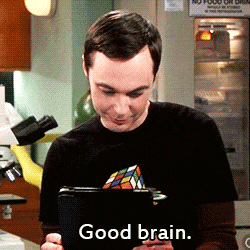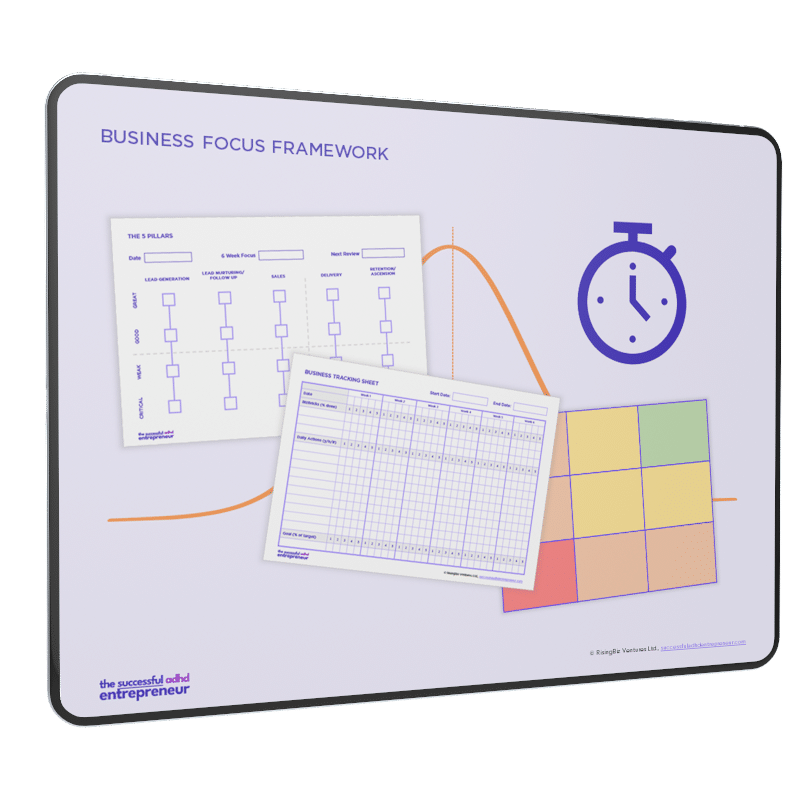Fight Procrastination: What you need to know to win the battle

Not being able to do the things we want to do makes us feel bad, whether we have ADHD or not. Even worse, we feel like WE are terrible people and don’t have much control over our lives.
Sometimes we think, we are simply lazy.
But we are not.
Because if you are simply lazy, you do not care about it. It’s o.k.
But if you suffer from procrastination, you experience an armada of stressful feelings. You know that if you do not do the necessary tasks to run your business, you will not achieve the things you want.
You know, if you don’t finish that project, you feel like a failure – not fulfilled, energized, and happy with the way you live your life. The consequences of delaying necessary tasks are apparent.
And we still don’t do them.
So how can we fight procrastination?
The answer to this question is not an easy one, as you probably already know. The good news is – you can fix it. It will take time and effort. But procrastination is nothing we can wait for to go away.
We cannot say: Get over it and do the thing nor can we hope to “find motivation” – someday.
There is a method to the madness, meaning there are physical, biological, and neurological reasons for procrastination – if you have ADHD or not.
Although people with ADHD probably suffer more from procrastination, not everybody is free from procrastinating who does not have ADHD. (Hint: I’m one of them.)
So, even with ADHD, these tips helped Mike while fighting procrastination.
Do you want to know how he went about it?
Of course, you want.
Fighting procrastination – what you need to know:
#1 – Procrastination has a purpose
You may think you are one of the few people on earth procrastinating. But that is not true. We all procrastinate from time to time.
Sometimes, we have sophisticated names for it. We call it research, preparation, organization, planning. But there is a reason humans procrastinate on specific tasks – and it is right in our brain.
Procrastination happens because we still have an ancient brain with only one task: Protecting our life. It does this by keeping us away from danger. Looking for potential threads, seeing problems coming, and planning upfront is one reason humanities evolved.
But this evolution came with a downside.
We see potential problems everywhere. Today it’s not the saber-toothed tiger we fear. But what if that thing that we want to put out there in the world is a failure?
What if we get criticized? Or if people laugh about us?
What if no one even recognizes we are there?
These are dangers to our ancient brain, and it tries to keep us safe and not waste our precious time and energy. When we procrastinate, our once healthy avoidance instinct gets triggered by negative emotions when trying to do the task.
What used to keep us from being dinner for a saber-tooth tiger became a problem itself. And if we want to fight procrastination, we need to understand this.
#2 – Procrastination is an addiction
When you research tips on how to beat procrastination, you find hundreds of hacks or tips. And they are great. Because if you go for a massive project like a to-do, you will set yourself up to fight against a whole herd of saber-tooth tigers.
Working with our brain, not against it, is critical. But still, solely relying on hacks and plans will not help you win the battle against procrastination.
Here is the thing:
On a nervous system level, procrastination is a state of freeze. It usually happens when we can’t fight or flight. We don’t do that consciously, nor do we necessarily feel “frozen.” It is like shutting down to save energy.
In freeze mode, our body is flooded with opiates, which numb us. This can be a good thing in certain situations, like a car accident, when we are hurt but don’t feel the pain initially.
But it can also become addictive because the unwanted behavior – procrastination – becomes the reward – the feelings we get from freeze state. Therefore, procrastination does not go away by itself.
And it is the reason why everybody can become a procrastinator, depending on the circumstances.
Indeed Covid-19 is one of these circumstances. When people are stressed, afraid, or depressed, they are more likely to procrastinate and delay or postpone their tasks.
Goals are at the mercy of something not in our control, so why bother moving towards something that feels so uncertain?
#3 – Procrastination is not the comfort-zone
Our ancient brain usually overestimates the pain when we think of things that feel hard to do when we leave our comfort zone. Things like writing a book or articles for your website, making videos, or engaging in social media.
And it is true.
A lot of the things we need to do in our business can feel challenging.
On the other hand, if we don’t do these things, what happens? We will feel discomfort because we didn’t act. So, we will experience unpleasant feelings anyway.
Not doing the thing that is important to us does not solve the problem.
We are not going to tell you that this alone is the solution to procrastination. But we promised to tell you what worked for us. And understanding that some suffering is inevitable was the first step on that journey.
#4 – Procrastination can be controlled
You know procrastination gets triggered by unpleasant feelings related to a task you want to do. Often, we don’t realize these feelings. Because why should we be afraid? Or why should it stress us?
We are grown-ups, and we can handle this.
But we can’t.
Because these feelings cannot be hacked with a workaround.
They come from our ancient brains, which we can’t talk to consciously. What we can reach is our evolved brain. I’m talking about the prefrontal cortex.
The prefrontal cortex is where your higher thinking and functioning come from. It’s where goalsetting and planning take place. And because of this, it can override the instincts of the ancient brain.
Our instincts may tell us, “First, I need to feel like doing it!”. Or “I have to wait for motivation to kick in!”.
But the more we avoid a task, the more we get the reward for inaction through the opiate release, which feels good, which is why we indulge more in idleness, which gives us … you know, that vicious cycle.
And very quickly, we have a self-sustaining circle of delaying tasks that will not stop by itself.
Uncertain what's important right now?
With our Business Focus Finder, it only takes 5 minutes to find out what you should work on in the next 6 weeks.
It also helps you to stay on track and cross the finish line - even if your ADHD causes you trouble with that.
Fight procrastination: Start with different work habits.
Increasing the tolerance to unpleasant feelings is the way to manage procrastination. But we must do it the right way.
All hacks, planning, or systems won’t work long term if we stand on the gas and the brake simultaneously.
Let me explain.
Two things come into play when we decide to take control of our productivity:
We compare ourselves to outside pictures.
That is movies, social media, people we (think we) know, etc. And it seems as if most of the people out there are Elon Musk-Clones when it comes to productivity.
But they are not.
Some people are very productive. Which sometimes comes with a background story and dire consequences like burnout, divorce, drug abuse, etc.
Not good.
Some stories about productivity are wrong. One can sit 12 hours in front of the computer, yes. But that is not being productive.
Research showed that everything above a 50-hour workweek leads to bad work. Not average – bad. And some experiments in Japan even suggest that working the bare minimum can lead to the best work output.
So, to get things done, we need to get real.
We try to compensate for past behavior.
When we procrastinate for a more extended period, we want to balance this by working even more, which is a recipe for disaster.
And you have probably experienced this already.
Because we get triggered as soon as we plan to work 8 hours daily on the project we dreaded for months, it’s like running a marathon after not being active for years.
By planning this way, we raise the terrible feelings so much that we don’t do anything. And good old ancient brain tells us: See, I told you!
How to end the cycle.
No. 1: Increase your tolerance step by step.
Understand that there are limits to specific activities. Research among writers showed that there is a sweet spot of three hours of focused writing. For programming, it is four hours.
Is it wise to do more as a former master procrastinator?
I trained people who had to do cold calls in their job but would not do it. One part of the training showed the people how it must be done to not run into the resistance of the interlocutor.
The other part was what to do to not run into the resistance of oneself.
The solution?
Plan for one cold call a day. I’m not joking—one call. Sure, most of the time, people would do more. But the rules were no more than five calls. And – don’t plan on making five or more calls the next day.
Stick with the 1-call-rule for at least four weeks. And then see if you can do more. If not, go back to one call.
The reason is simple. Even if you know that you will probably do more than one call, you keep resistance down. You feel like being in control.
The prefrontal cortex may say: Don’t be silly. Do more than that.
But your old brain, with much-experienced rejection (and a lot of fear), tells you: Why should this work this time? No way.
And it won’t work.
The goal at this stage is not to challenge you. The goal is to get back in the game. To gain some momentum and a feeling of accomplishment, which is crucial to healing.

To recognize we did something, even if it is small, helps with procrastination in the long term.
No. 2: Approach tasks differently.
You are smart. As a business owner with ADHD, you are super-smart. But being smart can get in the way when you try to do the things you delay.
Because you are not used to doing it the easy way or the simple way. Your whole life was complicated. You had to fight through and muster every piece of energy to get things done.
Or some things.
But there are a lot of things you could do differently. Because delaying tasks indeed is one of the things you need to know if you have ADHD on your team.
When you start your battle against procrastination, begin with a task that is a. important to you. And b. could have a positive impact on your business.
No. 3: Use your inside activators.
These tips had a massive impact on our life when we started to use them. But we still had the feeling “there could be more.” More ease, less pain, less fighting.
And we stumbled upon ACT (acceptance and commitment training) and especially one specific piece, which did the trick. ACT has shown excellent results for treating OCD and eating disorders like bulimia, which made me listen.
For Mike, who has ADHD, it was the missing link between the feelings and the doing. ADHD is not a problem of not knowing what to do, but an issue of not doing it. Which is procrastination.
Procrastination is a problem with self-regulation.
But although you can read that ADHD is a problem with feelings (as opposed to a general lack of attention), we did not find much advice for handling them. Most advice gives hacks. Which can be significant.
But with ADHD, things are a little more complicated (and I’m pretty sure you experienced that already).
There is forgetfulness. And the most fantastic hack does not work if it is forgotten.
And there is considerable resistance caused by the impairment of executive functioning.
The basis of ACT is – on the other hand – the acceptance that feelings are a part of life. All feelings. And to move on with life, even though there are complicated feelings at times, we can commit to our values.
These are questions like: What kind of person do you want to be? What characteristics do you believe are valuable as a friend, a spouse, a business owner, or an employee?
Being clear on our values can considerably impact how we act and behave when procrastination shows up. (And it will, it’s normal.)
An example:
If someone values family but never makes time for family, they do not live congruently with this value. So, to do that, there needs to be a change. This does not mean one has to become a different person. Just looking at one’s values (we have them written out and hanging in our offices) can help think:
Although I don’t feel like that and am tired today, I will spend half an hour playing with my kid.
We tried to white-knuckle our way to finish projects. But that often left us exhausted. Our experience was that the value-based approach helps to do the work even if you have ADHD.
Here is a brief explanation (13 minutes) from Timothy Gordon:
No. 4: Fix the root-cause
To fight procrastination, it may be necessary to look deeper. Newer research shows that procrastination can result from trauma and the problems that can come with it.
For example, OCD, C-PTSD, self-doubt, perfectionism, fear of failure or success, and even ADHD itself.
To quote James Ochoa (Focused Forward):
“It’s a chronic state of emotional stress directly related to the struggle to live life with ADHD, stress that breaks down emotional tolerance, stamina, and the ability to maintain a strong sense of wellbeing and spiritual health. The chronic, life-long nature of ADHD-related stress can increase to such a level that it becomes a syndrome akin to post-traumatic stress disorder (PTSD).”
Starting to heal the nervous system can be a decisive step to get out of the grip procrastination can have because the more calm and regulated the nervous system is, the more room we have for creativity.
If we feel in danger – which does not have to be real but perceived danger – the body sends out the signal to save all the energy to fight or flight.
Some links we found beneficial for us personally and with clients:
Irene Lyon, who has several great free mini-courses and other resources on her website and her youtube channel.
Emma McAdam from Therapy in a Nutshell has a great freebie with resources and makes new videos every week.
Summary
Even with ADHD, it is possible to fight procrastination. The key is to understand that procrastination is a response from our ancient brain to a task that triggers negative feelings.
In addition to that, procrastination can become an addiction.
We don’t heal addictions by insulting us, calling us stupid (or lazy). We need compassion for ourselves, make a plan, follow some guidelines, start small, and do our best every day.
P.S. Whenever you're ready … here are three ways we can help you grow your business.
1. Watch our free video course, "The Business Focus Framework."
The shortcut to the most important tasks in your business that helps actually to follow through. It takes 5 minutes to find out what to work on for the next 6 weeks. – Click here.
2. Increase your close rate up to 84% (free guide).This short guide helps you have successful conversations with customers without being pushy or salesy, even if you think you are not good at selling. - Click here.
3. Work with us 1:1.
If you are curious how working with us looks like, hop on the "Work Together" page. And if it speaks to you, schedule your Discover the Possibilities Call by emailing me: I want that! To andrea@successfuladhdentrepreneur.com, and I’ll send you a link to our automated scheduling system.


